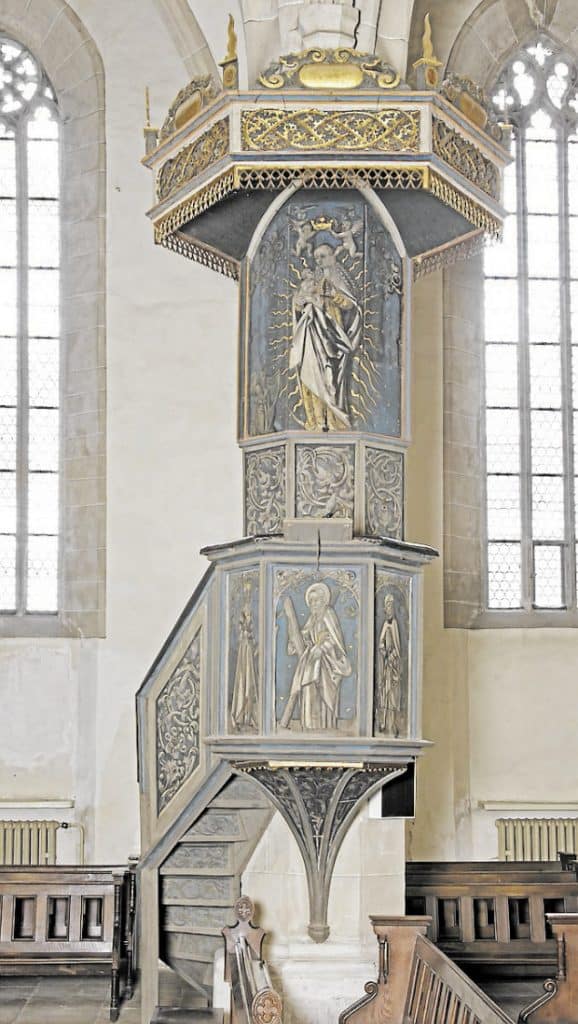⏱️ Estimated Reading Time: 11 min read
My beloved son, there is something that I want to talk to you about today. It has been on my mind as I have observed our evangelical Christian culture. The matter that I seek to address is that of “the pulpit.” The “pulpit” is a word that signifies more than a lectern, a wooden (or Plexiglas) “stand” on which to place your Bible and notes. The word that developed across the years has pulsated with a bountiful meaning, conveying a veritable treasure chest of sacred features and fine facets of biblical Christianity. I don’t believe it is a matter of style or a matter of my just growing old to say what I’m about to say. I am concerned that there is a loss of meaning in the pulpit. This is not only an affliction of the Preacher — and, yes, I believe that it is a pathology that is developing upon the soul of the Church — but also a dire symptom of a spiritual disease in our precious People. There has been a demonstrable, observable, quantifiable “downgrade” (to use the word associated with the famous controversy that Charles Haddon Spurgeon endured) of that which we used to call “the pulpit.” Rather than bemoan a litany of lesions that I see coming up on the Church in this regard, I would prefer to address things positively. So let me say two things to you that are on my mind today about “the Pulpit.”
First, there is a dignity in the ministry of the pulpit.
Make sure that you maintain that dignity and respect in your own life and ministry.
My late mentor, Dr. D. James Kennedy was once asked why he wore a robe in the primary worship service of the church. He responded to them and told me privately:
“The office is more worthy than any judge’s bench, it is more solemn than any scholar’s chair. The public ministry of conducting divine services of worship, declaring the unsearchable riches of Christ, and administering the holy Sacraments of God demand utmost respect. The robe is not about me. It is about the office. Others may express that dignity in their way. This is mine. But, Mike, what is yours? How will you respect the office in the public worship of the living God?”
Others may be tempted to answer that by saying, “I shall do so spiritually. I do not need a robe, or a stool, or any other clerical attire.” Very well. But how do you distinguish between the man and the office? How do you humble yourself beneath the dignity, honor, and high calling of the pastoral ministry? That is your question.
Now, my dear Lad, when I speak of dignity in the pulpit, I am referring to reverence. I am saying, ”The pulpit” — the sacred place of proclaiming the unsearchable riches of Christ according to the inerrant and the infallible word of God — is deserving of the most excellent scholarship, and the most solemn and sober appreciation of the God-granted privilege. The pulpit is a comprehensive term to describe the sacred space of the calling to stand, at once, before God and Man to proclaim the unsearchable riches of Christ. The pulpit is the compendium of the Christian shepherd’s calling, preparation, education, training, prayer, tears, indignities, as well as the trials suffered by the attacks of the devil. The pulpit is the ministry of the Word in all of its fullness. It is no wonder that the Huguenots fled from the revolutionary anarchists by moving from camp to camp in the French forests, always with men assigned to carry the pulpit on their backs. Those Galatian Protestants esteemed the Word of God highly. The pulpit, undoubtedly the sole surviving artifact of an edifice consecrated to God, by then demolished by atheistic mobs, was precious to them for it exemplified the Word of God among them.
I am grieved deeply whenever I see those who have purportedly been separated out by the Holy Spirit to preach the Gospel of Jesus Christ approaching the pulpit as if they were about to give a speech at a sales convention, a TED-talk, or, worse, address a pep-rally before a big ballgame. I must say that the casual and flagrantly informal ”style” that is shown by some, not all, makes me think that these ministers do not understand that they hold the authority of the eternal God in their hands.
Thinking of the old Master at “Elephant and Castle,” C.H. Spurgeon, we are told (in his biographies) that Pastor Spurgeon was frequently afflicted by nightmares on the evenings before he preached at Metropolitan Tabernacle. One may suppose that this is a likely consequence of the tragedy that occurred on that Sunday evening at Surrey Garden Music Hall, 19 October 1856. “The lad from Cambridgeshire,” twenty-five-year-old Charles Spurgeon, preached in London raising funds for the dedication of the new Metropolitan Tabernacle. Opponents of the young preacher (and his message) screamed “fire!” The resulting chaos caused the over 14,000 worshippers to panic and flee in fright. Alas, eight souls were taken to eternity beneath the crushing scramble for congested exits. Such an explanation for the Great Preacher’s frequent bouts with depression may very well be correct. But according to Spurgeon, the 19th century Prince of Preachers was distraught by another vision: the reality that a man like himself would stand in the pulpit and souls would be “hanging between heaven and hell” before him. And, “Yes, Charles Spurgeon was an unrepentant Calvinist.” He rightly believed in the end as well as the means and the means of reaching the lost was the passionate, compelling, thorough but plain proclamation of the Gospel of our God and Savior Jesus Christ. The nightmares were evidence of his appreciation of his role and the office to which he was called by Christ Jesus. And we know that “And no man taketh this honor unto himself” (Hebrews 5:4a KJV). Preaching repentance and faith in Jesus Christ as the resurrected and reigning Lord of all is a holy calling. It is a weighty duty. It will cost you your life. This, too, is the pulpit.
I am not saying for you to become gloomy in your approach to ministry (or, much worse, to feign a seriousness that you just don’t know or “feel” deeply). Quite the contrary. The Body of Christ to whom you minister, and the watching world, should witness a pastoral ministry that is cheerful but not giddy, contented but not resigned, and one that effuses the golden radiance of the glory of God and the grace of Christ. But there is a way to approach your work with a vision of the weight of the holy office and to “climb into the pulpit” (an expression born of architectural realities, but remains with us as it took on spiritual meanings about the work of preaching) with Christian reverence and vocational gravitas. You will never regret taking time to pray and to seek God over the embodied souls that will be in front of you as you preach. You will never regret ascending the pulpit as if following your spiritual forbearer, Isaiah, in chapter 6 of his “Gospel:”
“Then I said, Woe is me: for I am undone, because I am a man of polluted lips, and I dwell in the midst of a people of polluted lips: for mine eyes have seen the King, and Lord of hosts.” (Isaiah 6:5 1599 Geneva Bible).
The fear of the Lord and the contemplation of the luminous majesty of his eternal glory is the first necessary experience that leads to the required vocational response, “Here am I. Send me.”
You will never regret devoted time in prayer before you preach, searching the Scriptures, and placing your soul beneath its iridescent lens. Oh, my beloved son in Christ: give the pulpit its due. Maintain the dignity of “the sacred desk” in your ministry.
Secondly, I want to say to you, “The Pulpit” is worthy of the most excellent scholarship.
The work of the pulpit is demanding. It requires the most assiduous attention to the Sacred Text, the context, the study of Biblical theology, systematic theology, historical theology, the original languages, pastoral theology, spiritual formation (how faith and life matures), rhetoric, logic, elocution, anthropology, and the sociology of “the parish.” The pulpit requires a ministry of the presence of one who has been with God. Even the pathologies of the human soul must be a lifelong study. Each division of continuing education requires your unswerving dedication to its assiduous study. You must be consecrated to (by prayer, and fasting when necessary) convert the catalytic knowledge derived from the respective subject into your pastoral love for the Saints—e.g., for a fourteen-year-old “covenant child” seated before you on the Lord’s Day, as she wrestles with “Jacob’s angel” to make her parent’s faith her own. The scholarship gained for the pulpit must be poured through the narrow channel of that funnel which distills the essence of God’s love for His People. This sweetens the pulpit’s solemnity and is what causes little children to stand on tipped-toes and “play preacher” after the service is over. Love makes transcendence imminent.
You are a “doctor of the soul.” Study the contours and crevices of the human soul, the “soft tissue” of the spirit, so sensitive and subject to wounds, the possible “sclerosis” of a part of the soul that could deny health to another part, signaling a spreading “disease.” Study the ways of assessing the parishioner’s presenting issue. Be careful to observe and allow the “presenting issue,” e.g., of “anger towards God,” to stir diagnostic questions that could direct you to the “under-belly” of the problem. Only in a careful, prayerful, scripturally informed assessment (of the presenting issues) and diagnosis (discovering the deeper issue beneath the presenting issue through study, question, prayer, observation, and testimony), can you move toward spiritual treatment of the maleficent maladies of the Trinity-cherished lambs of God for whom you were called to be (under) shepherd. This, also, is the work of the pulpit as well as the study. Indeed, none of us are as qualified in this methodology as, for example, the great Martyn Lloyd-Jones, MD. That Welsh giant in the twentieth-century history of the Church used the unsurpassed medical training at Saint Bartholomew’s to surgically assess, clinically diagnose, and meticulously treat with the scalpel of (just the right portion and proportion of) the Word of God.
“For the word of God is living and active, sharper than any two-edged sword, piercing to the division of soul and of spirit, of joints and of marrow, and discerning the thoughts and intentions of the heart” (Hebrews 4:12 ESV).
Though we might lack medical training in diagnostic technique, we may study, practice, and learn how to clinically assess, diagnose, and treat spiritual wounds before us with those unassailable medicines, the copper-bottomed remedy in the means of grace: Word, Sacrament, and Prayer. My beloved son, you must offer your entire life to such valuable employment. You will never regret it. What does St. Paul say to young Timothy?
“Until I come, devote yourself to the public reading of Scripture, to preaching and to teaching. 14 Do not neglect your gift, which was given you through prophecy when the body of elders laid their hands on you: (1 Timothy 4:13,14 NIV).
Of all the many tasks that St. Paul could have urged upon Pastor Timothy, he chose the public reading of the Scriptures. So, also, I would advise you take the pulpit seriously and do not diminish its importance and its power: the power of the Word of God through the ministry of the Holy Spirit for spiritual healing and for fulfilling the mission of God in the world. But this requires a reorientation (read Martin Thornton’s Reorientation to the Pastoral Ministry) to the pastoral ministry wherein your primary identity is that of shepherd, ambassador, steward of the mysteries of God, scholar of the word of God, and, to, again, borrow from the Seventeenth Century English Puritans, “Physician of the soul.”
These are but a few thoughts concerning “The Pulpit.” I pray that the Lord will give you strength to withstand the temptations to allow the pulpit to become a soapbox, or a lectures stand, or an entertainment platform to show off your rhetorical, personality-centered prowess. You are merely a “preacher-boy.” But you are an Ambassador of a King. And you are always the God-ordained shepherd to speak the Word of God to that little 14-year-old girl. She deserves nothing less than the full dedication of the pastor to the sacred work of the Pulpit.
One final admonition: do not seek the pulpit of great preachers to attain to some greater reputation in ministry. It is very likely that the dais where they preached was inherited from some humble, anonymous minister. The pulpit does not make the man. The man of God makes the pulpit. The pulpit entrusted to you by that congregation, presbytery, association, district or diocese—the pulpit where you preach today—is the place where others may one day say, “Oh, what a faithful ministry went forth from that sacred desk.”




